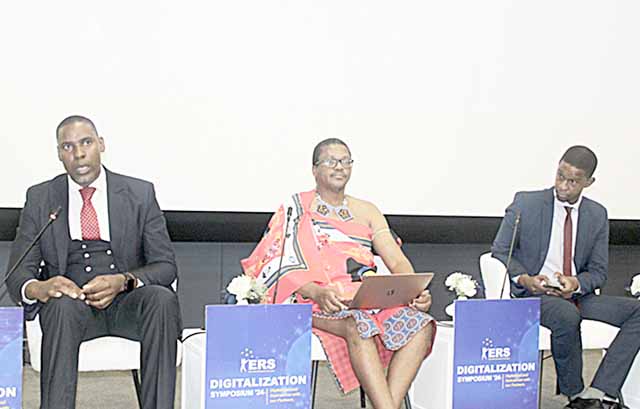By Nomfanelo Maziya | 2024-12-13

Aspiring entrepreneurs in Eswatini are set to benefit from a simplified business registration process.
Eswatini Revenue Service (ERS) has announced that new businesses will now be issued a Tax Identification Number (TIN) simultaneously with their Certificate of Incorporation.
This streamlined approach eliminates the need for separate visits to the ERS offices to obtain a TIN, a crucial step in the business registration process.
The initiative is part of the ERS's Seamless Registration Programme, which aims to make it easier for businesses to register and comply with tax regulations.
This development was highlighted during the ERS Digitalisation Roadmap Symposium, held yesterday at the organistion’s headquarters under the theme “Digitalised and Data-driven with Our Partners.”
The event showcased ERS’s ambitious journey toward digital transformation, which aligns with its 2024-2027 strategic goals.
“The TIN is the prerequisite for our clients to interact with us and also interact with us through the borders,” explained Commissioner Domestic Taxes Vusi Ngcamphalala.
He stated that, “seamless registration says ERS aims to make registration process as automated as possible.
This integration between the company registration process and tax registration will significantly reduce administrative burdens for businesses.
So the seamless registration says we want to make our registration process as automated as possible. So what we are planning to do is that companies that go to register with the registrar of companies or municipal council, depending on the size of the business, will be issued a tax registration number along with their business certificate,’ said Ngcamphalala.
By automating the process, the ERS aims to minimise manual intervention and enhance efficiency.
“Ours will be to monitor activity and make sure that we know when the taxpayer is starting to make money. Our processes are going to connect systems between us and the points where companies register so that it doesn't require clients to come to the ERS for registration,” he said.
The ERS's digital transformation journey extends beyond streamlined registration.
This is just one of the four key pillars of digitalisation for the ERS.
Others, according to Commissioner General Brightwell Nkambule, are transformed declarations, integrated payments, and smart customs.
"Yes, we will deploy technology, but more important is the collaboration," said Nkambule, who further highlighted that the ERS's digital journey was only to ensure that taxpayers should not pay a penny more than they should.
Another pillar is transformed declarations, which will ensure that tax filing and declaration will never be the same.
Leveraging technology, ERS import and export declarations will be processed and issued in real time with accurate information straight from the client and third parties to the databases.
This will minimise manual entries, compliance tasks, and enhance accuracy.
The other pillar is integrated payments, which means ERS systems will interface directly with banking platforms, offering faster processing and instant payments.
This, according to Chief Financial Officer Thobile Dlamini, will be done in three phases: integration with banks, integration with mobile money and point of sale, and finally integration with e-commerce.
Then finally, smart customs, which aims to ensure single declaration at the borders.
share story
Post Your Comments Below
As we embrace the festive season, it is crucial to prioritise your safety and that of your fellow...

Aspiring entrepreneurs in Eswatini are set to benefit from a simplified business registration pro...

In a troubling move, directors of the Miss Eswatini pageant, represented by Oukitel, have declare...

Prime Minister Russell Mmiso Dlamini says government cannot keep on hoping and they have run out ...
All material © Swazi Observer. Material may not be published or reproduced in any form without prior written permission.
Design by Real Image Internet